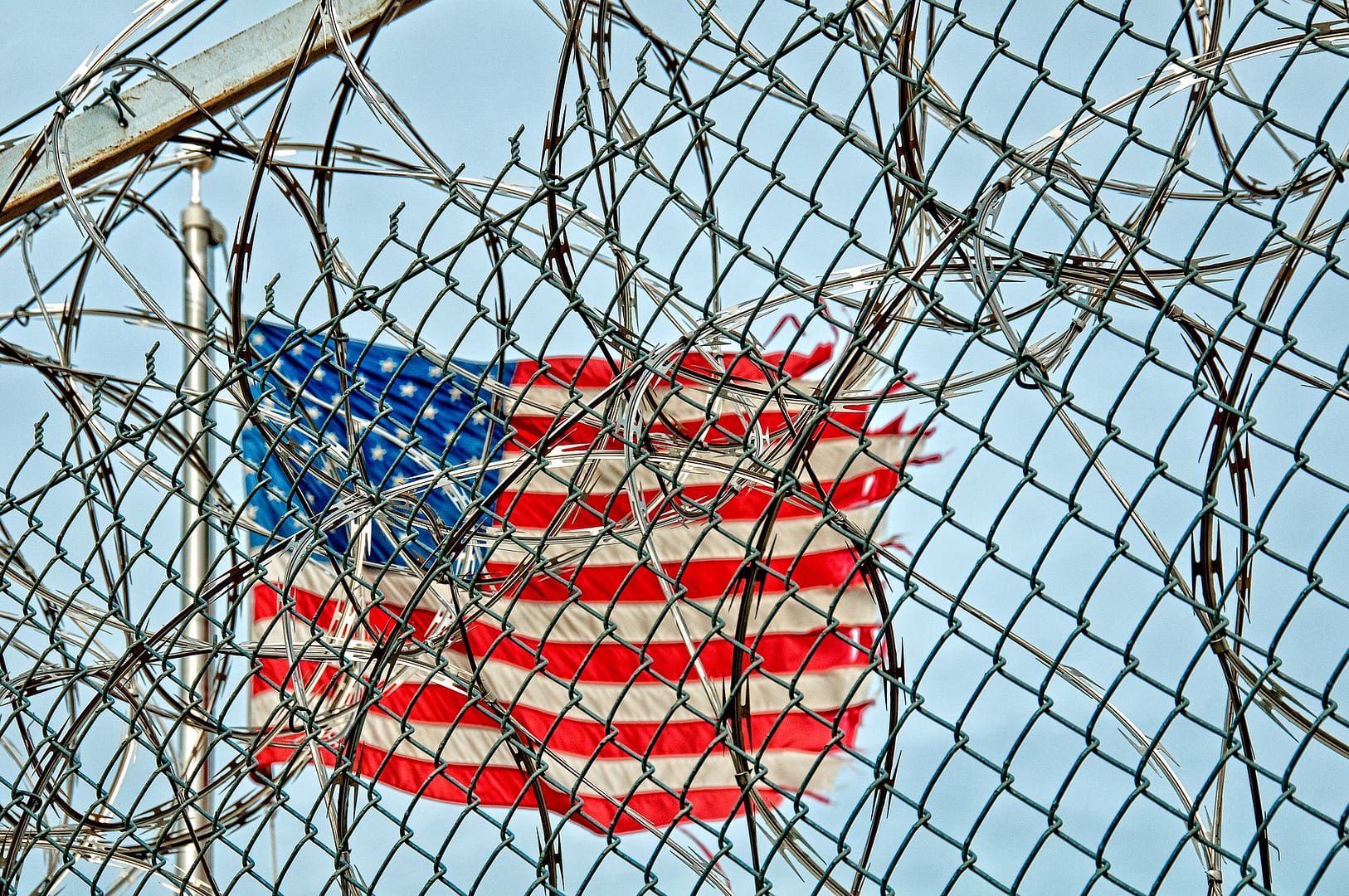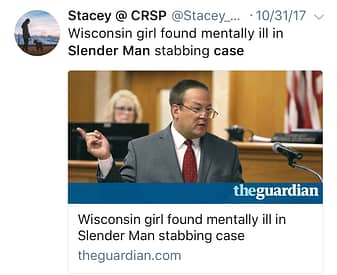[dropcap]O[/dropcap]n May 31, 2014 a twelve-year-old girl named Payton Leutner was stabbed 19 times by two of her twelve-year-old friends who were trying to please a fictional character called Slender Man. Leutner’s friends lured her into a Waukesha park, stabbed her and left her for dead. If the two twelve-year-old girls were convicted in juvenile court, they would stay in jail until they are 18, but when released back into their neighborhood, they would have intense supervision and services. However, according to Huffington Post, if convicted as adults “they would face up to 65 years in prison with a combination of prison and extended supervision under the Department of Corrections.”

Image by cocoparisienne
The two young girls convicted of the crime were 13 at the time of the trial. Even though the two were juveniles they were tried as adults because they seemed to plan the attack months in advance. This made them seem too dangerous and unsafe in a juvenile court. One of the girls was diagnosed with early-onset schizophrenia which led to them being tried in adult court.
If a juvenile is someone who committed a crime under the age of 18, it is wrong to have them in a court justified for adults. Nolo news explains how a case can get waivered.
In an article form Nolo the waivering process get looked at and expanded on in the topic of a juvenile being tried as adults. An article from Nolo states, “Some juvenile cases get transferred to the adult criminal court through a process called a waiver.” A waiver is when a judge waives the protections of the juvenile court. Usually, cases waver as a result of a more serious crime, or they are juveniles who have previously committed crimes and have a history with violence. An article from Nolo states, “Although being tried in adult court gives a juvenile more protection, it has distinct disadvantages too, which including the potential for a more severe sentence and the possibility of serving time in an adult correctional facility.” Some factors that might help a case get a waiver is if the juvenile has a serious offense on their record, or the minor is older. There are many reasons why juveniles should not be tried as adults.
Reasons Why Juveniles Should not be Tried as Adults
- Young offenders are being put at risk
One of the biggest problems when a juvenile commits a crime is the possibility of going to adult court. It can be very dangerous, especially if they are young. Many juveniles lack the maturity when faced with the problems that come up in an adult prison.
[perfectpullquote align=”left” bordertop=”false” cite=”” link=”” color=”” class=”” size=””] That the teenage brain is like a car with a good accelerator but a weak brake.
Laurence Steinberg, professor of phycology at Temple University[/perfectpullquote]
- Fewer varieties of punishment
When minors are getting their sentence in adult court they got to prison and have the possibility of given the death sentence. However, when faced with juvenile court minors are given a curfew, house arrest or counseling.
- Juveniles are given the message of lost hope
When juveniles are given a longer sentence and in prison, it gives them the impression that there is no hope for their future. This is damaging for the juvenile and for their family.
- It provokes child offenders
When juveniles are being tried as adults it provokes aggression, and they may become more violent. They may pick up worse habits while in the adult prison.
- Crime records follow
Crimes committed on a juvenile record hold much less weight than if on an adult’s record. This will affect the rest of a person’s life if it goes on their adult record. It could end up affecting how they are able to get a job when they are older.
- Lasting effect on their life
A child with a criminal record has to deal with it for the rest of their life. It gives them a hard time blending in with society, and they have limited options when it comes to learning.
[perfectpullquote align=”right” bordertop=”false” cite=”” link=”” color=”” class=”” size=””] There are 22 states where a child as young as 7 can be prosecuted as an adult. [/perfectpullquote]
Jordan Brown will never be able to live a remotely normal life because he was sentenced to life in prison. It all happened in February of 2009. Jordan Brown was just 11 years old when he killed his soon to be step-mother, Kenzie Houk, who was 8 and a half months pregnant. Brown was convicted of two counts of homicide.
In 2010 the question was being raised in the supreme court about the practice of sentencing young people under the age of 14 to life in prison without parole. There are 22 states where a child as young as 7 can be prosecuted as an adult. Many of these laws passed during a time when judicial court spiked in the 1980s to 1990s.
When deciding the ruling of Jordan Brown’s case, John Bongivengo of the Lawrence County District Attorney’s Office stated, “My choice is either to charge him as an adult or don’t charge him, not charging him at all wasn’t feasible.” It is rare for someone as young as Jordan Brown to commit such a violent crime, so when the desition was left to John Bongivengo he felt he had only one option.
Laurence Steinberg is an American university professor of psychology and specializes in child and adolescent psychological development. Among his studies he has discovered, “the teenage brain is like a car with a good accelerator but a weak brake. With powerful impulses under poor control, they likely result in a crash.”
[perfectpullquote align=”left” bordertop=”false” cite=”” link=”” color=”” class=”” size=””] In almost half the states across the country, children can be prosecuted and tried as adults. [/perfectpullquote]
Kenzie Houk was the victim of Jordan Brown’s crime and she was found by one of her daughters who was 4 years old at the time. After finding her mother the 4-year-old went to tell her grandmother. She has said, “Grandma, I got up that morning, I went down to get mommy, I shook her and she wouldn’t wake and she had blood on her back.”
Prosecutors said there was tension between Jordan and his stepmom because she moved into his father’s farmhouse. Jordan was jealous of Houk and her two daughters.
Prosecutors also said there was “strong physical evidence” connecting Jordan to the crime. There was gunshot residue on Jordan Brown’s shirt, and the police said the gun “smelled like it had been freshly fired.”
Jordan Brown’s case was first charged as an adult. Judge Motto denied the transfer to juvenile court. After Pennsylvania’s Supreme Court ruled Motto violated Brown’s fifth amendment, the rule was reversed and Jordan Brown was tried in juvenile court.
Jordan spent 3 years in a transitional unit for juveniles, where most spend 21 days. Brown was eventually ruled guilty and sent to Lawrence County Jail in Pennsylvania.
Mr. Brown makes a 4 hour round trip to see his kid in juvenile court. After 13 long months of Jordan Brown being in the facility, his father has seen the types of people he has been with, “‘The boys and girls, the kids that he’s with, they’re pretty harsh kids. He’s not there with the Boy Scouts.'”
Even Jordan’s father has seen the downside of sending him to the juvenile detention center: “‘Keep in mind, [he was] 11 years old when this happened,[…] in the environment that he’s in, a child like that is going to break down and his story has not changed from day one.'”
Sending a juvenile to adult court should be a case-to-case discussion. There has been a handful of cases where a juvenile has committed a crime and sent to adult court based on the facts, but there has also been a case that given the facts the judges were to obligated to sent it to adult court.
In the slender man case, the young girls did not kill anyone, but the seriousness of the other facts pushed it to adult court. On the other hand, the Jordan Brown case resulted in two degree’s of homicide and he was tired as a juvenile.
Michele Deitch addresses the problem of youth who are prosecuted in the adult criminal justice system and confined in adult jails and prisons. Trained as a lawyer, her particular expertise includes juveniles in the adult system, the management of juvenile offenders, and prison conditions and independent correctional oversight. She has authored numerous publications on these issues that have garnered national attention.
Featured Image by babawawa






Adam
Lets be honest, when you told us 22 states are legally allowed to try children as young as seven as adults. I found that quite surprising. Still, I don’t see many 7 year old murderers running around. And just because they are tried as an adult, does not mean they will receive the death penalty. (You can’t receive it if your under 18 anyways) “In a 2005 decision called Roper v. Simmons, the Supreme Court of the United States ruled that the execution of people who were under 18 at the time of their crimes violates the federal constitutional guarantee against cruel and unusual punishments.”
https://capitalpunishmentincontext.org/issues/juveniles
The child will be tried, and when the jury has come to a decision, action will be taken. We have due process for a reason, so people who are innocent don’t end up on death row or receiving the wrong sentence. The system isn’t perfect, no system is. But it’s what we have in place now and for the most part works just fine.
Richard Nixon
It’s the kids fault, if they killed someone they don’t deserve to “blend in with society.”
TheSmartBoard
If you kill or stab someone 17 times like the slenderman case. Or when two 10 year olds kidnap a two year old child and beat him to death with an iron bar. “counseling” or “house arrest” won’t fix the child. They deserve to have that follow them forever. They deserve to spend life in prison. A life is a life, no matter the age of the killer.
https://www.theguardian.com/uk/1993/nov/02/bulger.tomsharratt
Anonymous
Sending a kid to prison for longer will have a lasting negative effect on their life? I don’t think it’s the punishment’s fault, it’s the crime itself. If a kid stabs their friend or shoots their stepmom, sending them to jail for a shorter time isn’t going to fix the problem, it’ll make it worse.
TriggerWarning
Okay, if they are gonna commit crimes that are the same if not worse as adults like stabbing a friend 19 times, try them as an adult. At that point, what would being tried as an adult hurt if they have already ruined their entire future forever. Murder is an adult crime. Treat it as so.